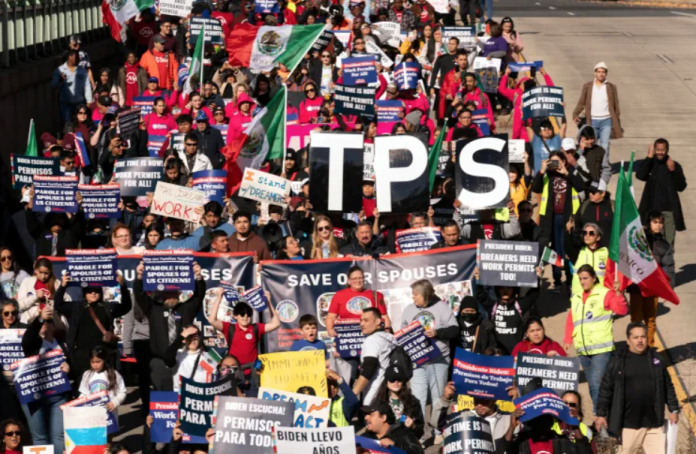The US president’s decision to renew the ‘temporary protected status’ comes as President-elect Trump prepares to take office.
The outgoing administration of President Joe Biden has announced an extension of the temporary protected status granted to immigrants from countries where the United States has determined it is not safe to return.
Friday’s announcement pertains to individuals from four specific countries: El Salvador, Sudan, Venezuela and Ukraine.
In each case, the designation of “temporary protected status” (TPS) has been extended for 18 months, based on continuing threats from war, humanitarian crises and natural disasters.
But the extension only applies to individuals already protected under the programme, falling short of calls by immigration advocates to broaden eligibility.
Nevertheless, the announcement is likely to be seen as a parting shot at the incoming administration of Donald Trump, who has pledged to crack down on immigration when he takes office on January 20.
An estimated 1,900 Sudanese, 103,700 Ukrainians, 232,000 Salvadorans and 600,000 Venezuelans are eligible for the TPS extension.
They must, however, re-register for the programme to take advantage of the 18-month extension.
Trump has had the TPS programme in his sights since his first term in office, from 2017 to 2021.
Under that administration, the Department of Homeland Security announced it would phase out temporary protected status for immigrants from countries including El Salvador, Haiti and Sudan.
A federal court in 2020 ultimately backed Trump’s authority to end the programme, raising fears that immigrants in the country legally could eventually be expelled.
When Biden succeeded Trump in 2021, he reversed course, increasing the population eligible for temporary protected status and adding countries like Venezuela and Afghanistan to the list.
Human rights groups applauded those changes, calling the protections desperately needed.
Still, groups like the American Civil Liberties Union (ACLU) pushed Biden to go further in protecting immigrants fleeing human rights abuses, war and other disasters.
In a 2022 statement, for instance, Emi Maclean, a staff lawyer at the ACLU’s branch in Northern California, pointed out that short-term extensions to TPS ultimately provide little security to immigrants over the long term.
“Today, TPS holders still do not have permanent residence, along with all the civil rights and political equality they deserve,” Maclean said.
“Most members of this community have lived in this country for decades.”
Others pointed out that Biden tightened other legal immigration pathways, like the right to apply for asylum. The Biden administration has also not extended TPS protections to other foreign nationals in desperate need, including Palestinians, leading to accusations of a double standard.
In addition, Biden continued several hardline immigration policies he inherited from Trump, including the controversial Title 42 measure, which allowed the US to quickly expel migrants and asylum seekers at the southern border, in the name of public safety.
That measure faced numerous court challenges as a violation of asylum law. Title 42 ultimately expired once the emergency declaration for the COVID-19 pandemic ended in May 2023.
Still, under Biden, the Pew Research Center estimates nearly 1.2 million non-citizen immigrants, out of a total of 21.6 million in the US, became eligible for TPS.
During the 2024 presidential campaign, however, immigration became a topic of fierce debate, with Trump proposing “mass deportation” efforts if he were elected for a second term.
When asked by News Nation in October if he would revoke TPS status for Haitian immigrants, Trump responded with misinformation about the community in Springfield, Ohio, where he previously accused Haitians of eating household pets.
“You have to remove the people. We cannot destroy our country,” Trump told News Nation.
“It doesn’t work. It can’t work. It has nothing to do with Haiti or anything else. It doesn’t work. You have to remove the people and you have to bring them back to their own country,” he added. “In my opinion, it’s not legal. It’s not legal for anyone to do.”
Trump ultimately won the 2024 race, and he has signalled he plans to move forward with his immigration crackdown during his first 100 days in office.
In Friday’s announcement, however, Biden’s administration emphasised the dire conditions that made the TPS extensions necessary.
Returning immigrants to Ukraine, for instance, would expose them to the violence of Russia’s ongoing invasion, which has “has led to high numbers of civilian casualties and reports of war crimes”, Homeland Security said in its statement.
In El Salvador, it explained, natural disasters like heavy storms and earthquakes have created perilous living conditions. And in Venezuela, “political and economic crises” under the “inhumane” government of Nicolas Maduro made returning unsafe.
Then there was Sudan, where the US accused paramilitary forces earlier this week of pursuing a campaign of genocide.
“Militias have targeted fleeing civilians, murdering innocent people escaping conflict, and prevented remaining civilians from accessing lifesaving supplies,” Homeland Security wrote.
“These conditions currently prevent Sudanese nationals and habitual residents from safely returning.”






















